Astana have been made to wait a week in order to get their licence for 2015. You suspect Alexander Vinokourov wouldn’t sweat if you put him in a banya but even the granite-faced Astana team boss must be feeling embarrassed.
Yesterday’s news from the UCI tells us all that’s missing for Astana’s licence is a piece of paper or something else that can be fixed in the coming week rather than something drastic. The Kazakh team are likely to get their licence. The case of Katusha in 2013 is instructive, originally investigated for financial reasons, the UCI Licence Commission grew exasperated with the team’s long list of doping cases and worried about the large number of staff with shady records. But the team got back its licence at the Court of Arbitration for Sport with pledges to clean up. We can expect Astana to have a one year licence with promises to improve things, maybe power-profiling riders and insisting on more outside anti-doping controls. Getting a licence to race is one thing but escaping the “team bogeyman” image will take more time.
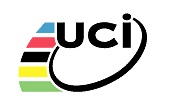
Licence Commission: I sometimes see people saying Brian Cookson needs to act on Astana’s licence. For a second let’s imagine he could wave a magic wand, many say the team should be banned. Joe Lindsey makes the point well over at Outside Online. But it does amount to collective punishment, hitting innocent riders for something they didn’t do. This should make us uneasy.
Now that second of imaginary punishment has passed, back to reality where Brian Cookson and the UCI can’t do much at all. The UCI’s Licence Commission is so independent it even meets outside the UCI’s offices. As for membership, it’s staffed by non-UCI people. It’s headed by Pierre Zappelli, a former Swiss Supreme Federal Court judge and he’s joined by Hans Höhener, ex-President of the Swiss Athletics Federation and a senior corporate executive called André Hurter. Three heavy hitters who operate about as independently as you can reasonably imagine. If you want to throw the book at Astana, first you have rewrite the book.
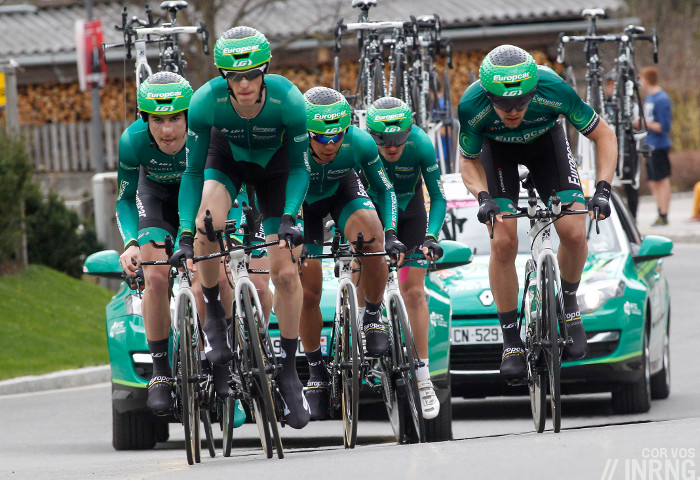
Europcar’s budget drive: Europcar meanwhile have budget issues. It’s sad that Astana has and endless supply of petrodollars but can’t buy a good image while Europcar’s got a near spotless image but can’t get fully funded (near spotless? Well we never got the full story on the Pierre Rolland cortisone story). Regional newspaper Sud Ouest quotes manager Jean-René Bernaudeau saying his Europcar team budget is 5% short for 2015, today’s L’Equipe says it’s 6%. It’s a simple question of setting out a business plan for 2015 with the budget for the year and then the likely deductions such as wages, fuel, hotel bills and so on, all judged against past audited accounts. Europcar are on the smallest budget already and cutting costs further is going to be hard, they don’t have luxuriously long training camps in Majorca or Mount Teide to chop away. Bernaudeau might still find the money but going down to Pro Conti would be no shame for the team. They’ve lost more riders and having to race three grand tours and on other, simultaneous, fronts could be too much to ask. With Pierre Rolland and Bryan Coquard they’re certain of a Tour de France wildcard.
Dysfunctional: all this fuss about the licences reveals a fundamental problem with the sport. There’s more drama over the administrative award of a licence than there is in the sporting aspect. We didn’t end the season watching teams fight for their position in the World Tour. Instead the headlines are generated by officials, accountants and lawyers.
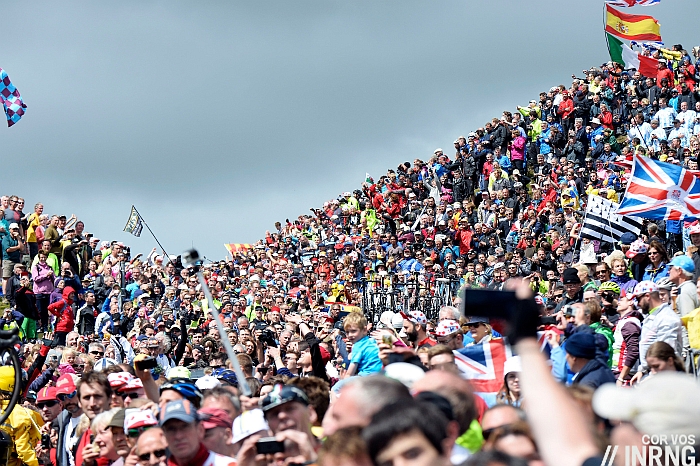
Talking of budgets a report yesterday claimed the Tour de France’s visit to Britain was a financial success. Only these studies are open to being gamed, essentially whoever commissions the report can go fishing for the answers they went. The methodology for this report is included in the back, much of the analysis is built on interviews with a small but hopefully representative sample and then extrapolations are built on top. By all means use the numbers for future reference but – something British broadcaster BBC missed – include the word “estimated” before them.
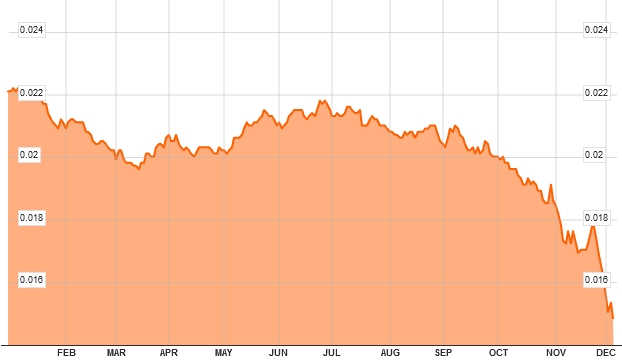
Rouble in trouble: one thing you don’t need to estimate is a foreign currency exchange rate. As the chart from Bloomberg above shows, the Russian Rouble has lost one third of its value over the past 12 months compared to the Euro. The cycling connection is that this means it’s got a lot more expensive for the backers of Katusha, Rusvelo, Tinkoff-Saxo and other teams to fund a squad that races in Europe and pays its staff in Euros. It will hurt the wallets of some but these teams have sponsors will deep backers rather so their budgets should be safe for 2015.
Russian trouble of another kind and the ARD documentary alleging widespread doping in Russian athletics has gone around the world. It’s by “Hajo” Seppelt, the journalist who flushed out Alberto Contador’s Tour de France positive test from the UCI after it had been kept quiet for weeks (update: he’s willing to talk to the UCI’s CIRC about this). It’s primarily about athletics but includes allegations that cyclists were involved, notably the claim that some cyclists were exempted from testing. The full transcript is now available in English.
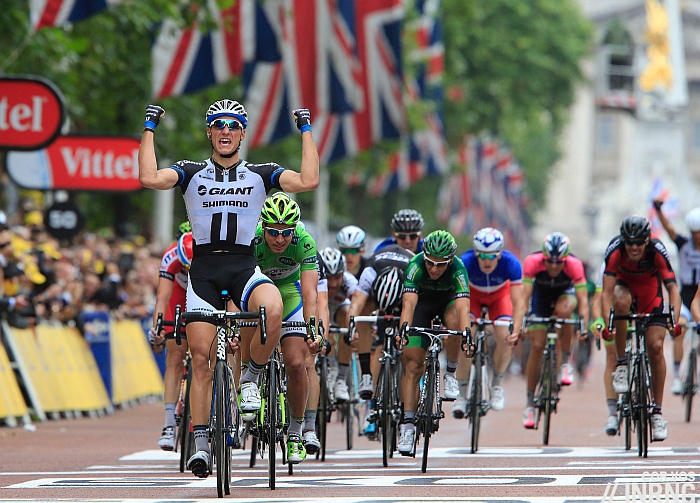
From German TV to German teams. Giant-Alpecin will be a German team for 2015. The difference? Nothing really except the flag that appears next to their name on TV graphics. It’s that simple. team registrations are an elective matter. Greenedge was accidentally listed as Italian on launch because it’s got its HQ in Italy for obvious logistical reasons. As for Giant-Alpecin it makes sense to adopt Europe’s largest consumer market as the home country given they’ve also got a German sponsor and have star German riders. It’ll be interesting to see if they recruit more riders from Germany.
One existing recruit is cyclo-cross specialist Lars van der Haar, surely the best-named rider in the world for a team sponsored a shampoo brand?
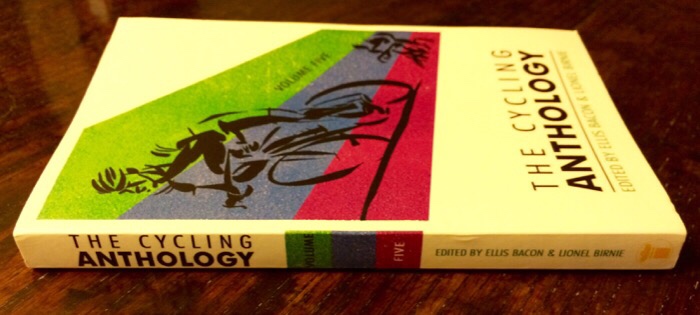
Cycling Anthology: I’ve reviewed this in the past, now a note to say Volume 5 is out now. If you’re not familiar with it, the Cycling Anthology is a collection of essays and what’s sometimes called long-form writing. It allows for more depth and to explore subjects that might not appear on cycling news websites nor to the regular sports magazines. The publishers were kind to send over a copy for free but I would have bought it for the pieces on the Tour de France by François Thomazeau and Daniel Friebe, a handy travel companion given it’s small size. Jeremy Whittle’s explores the subject of panache and excoriates Thomas Voeckler, a bonus for many. There’s plenty more, especially for a British audience with tales of long-lost professionals and rogue teams. If you like this blog you’ll probably like this book.

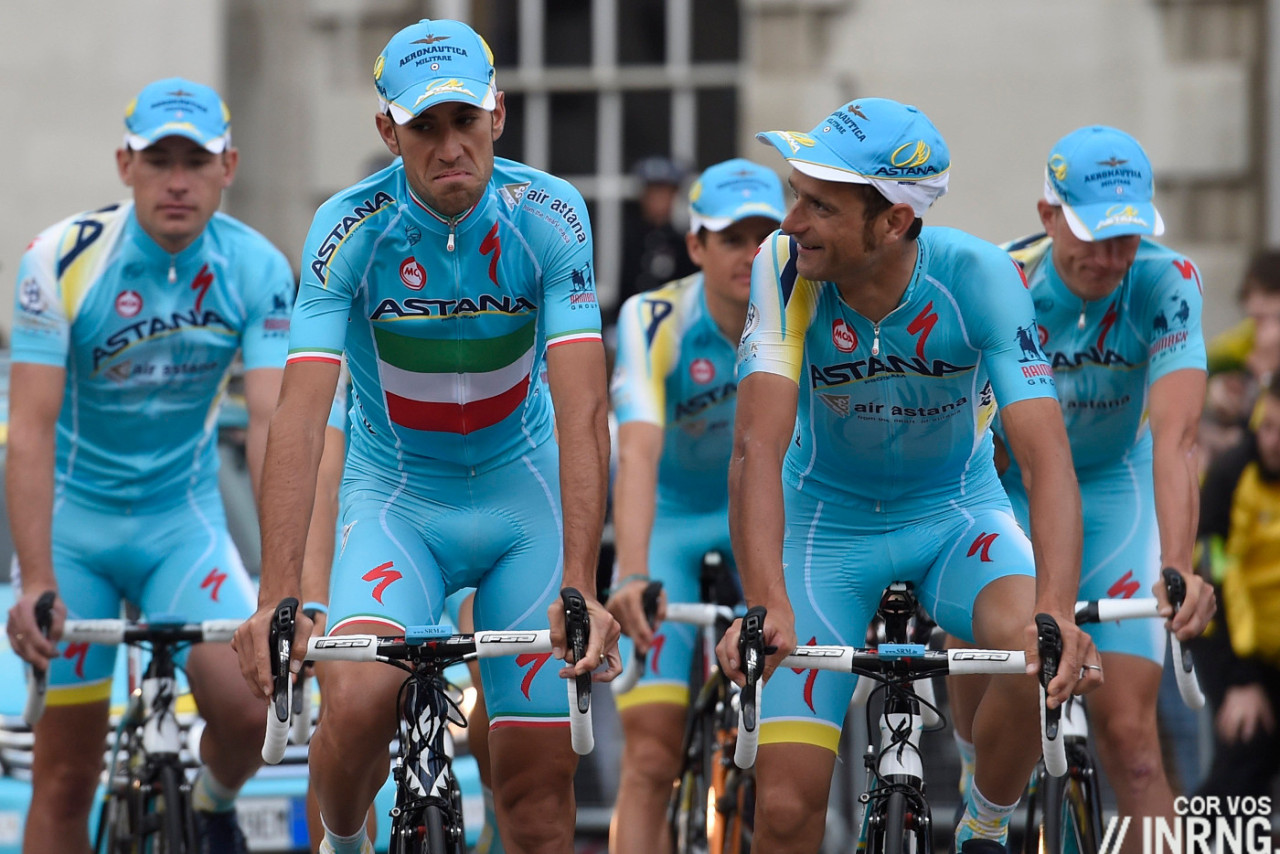
Three heavy hitters who operate about as independently as you can reasonably imagine.
Except, the process to get a WT license is secret. Like Seppelt’s latest work shows, there are many ways to game a system that is run by the sports federations. Given the UCI’s history of corruption, there is little confidence the WT license process operates with integrity outside the independent analysis.
True but it’s as beyond the reach of Cookson and Co as it can be and I wanted to remind readers that that it’s not in Cookson’s remit to toy with licences.
Regarding the depreciation of the rouble, the writing has been on the wall for quite some time and I’m sure that at least Tinkoff (being a financial institution and all) has hedged the currency to offset the fall.
He sold off a lot of his TCS bank, presumably holding the proceeds in a range of currencies. Rule 1 for wealthy Russians is to become wealthy, Rule 2 seems to be to get the money out of Russia whether buying villas, sports clubs, art or foreign bank accounts.
Speaking of gaming marketing numbers, Ponferrada’s city council that bought the rights to host the UCI WC for 2014 released a report comparing all Euros spent in the region during the event to the cost of the event and declared a surplus.
An event surplus would have been all VAT collected during the period being higher than the cost of the event. It was a huge money loser.
The Worlds is problematic, it is considered very expensive. But it needs careful management, the Ponferrada race didn’t have a great course, there wasn’t much going on before it and so on. Richmond 2015 seems to have more marketing behind it and should draw fans from across the USA.
The funny thing is that Ponferrada didn’t choose its course, the UCI refused to accept the original proposed course because it was “too hilly”, so some other course had to be devised. A good example of what we call in Spanish “además de puta poner la cama” (besides being the whore having to pay for the bed). Of course Zolder or Copenhague were not “too flat”, and were the most epic races ever.
Seems like you would allow Eurocar the 5% deficit given their forthright announcement of 1 year to go. Yes? They’ll be staying in some even shadier hotels and eating more conservatively but I’m sure could pull it off. I wish France would give them a little break on that 30%? employment tax you detailed a while back. I still can’t get over that one. It’s like a nationally imposed headwind for those teams.
Why don’t you wish everybody else aligned their taxes with French ones? It’d do away with nationally provided tailwind for non-French teams. And it would help public finances in this age of pressure.
It’s that nationally imposed headwind that guarantees them a wildcard invite if they go down to Pro Conti level, so it can work out well.
If, by refusing Astana a licence, innocent riders, support staff etc are also punished, then that is just unfortunate consequence.
As with any type of sanctions, the guiltless are effected but that’s part of the point. Current sanctions against Russia for example have a bearing on the man and women in the street even though they don’t control the states policy on Ukraine. The hope is in these types of cases is that the ‘people’ bring pressure to bear on their leaders to force change.
Maybe a couple of high profile riders struggling to find a team before the season starts (ie struggle to find an equivalent salary) might have a similar effect.
Oh yeah.
Making the powerless even more powerless usually empowers them to throw off the powerful ruling subjects whom other powerful subjects says they themselves “wouldn’t be entitled” – but really *aren’t able* (or just don’t want) – to personally overthrow.
What a surprise that it’s a strategy which, more often than not, fails miserably! (at least to achieve its *declared* purposes).
Collective Sanctions: Mostly, an History of Ineffectiveness (Not To Mention Their Utter Dangerousness) 😛
I wonder why people (especially those who aren’t exposed to them, we should add) use to fancy that kind of things. Sheeer sadism, maybe.
This would be why I used the term ‘hope’.
What’s the famous line about “doing the right thing after all the alternatives have been tried”? In the case of cheating in pro cycling, pretty much everything else has been tried, yet here we are with the sport in dire straights in so many ways. Nobody can argue the lack of credibility caused by near- continuous doping stories is a big factor in this. Meanwhile, dopers get caught and tossed away like used toilet-tissue while the teams who benefit from their cheating go on their merry way. I’ll admit Astana didn’t seem to learn anything from being excluded from LeTour once before, but if pro cycling is to demonstrate any real effort into cleaning up, they need to pull the plug on Astana, even at the risk of losing at CAS. If innocents are punished, it’s Vino and Co who have punished them as they knew well the history of this team long before they signed any contracts.
+1. Whats the worse that can happen?
Unfortunate consequence?!? Why not forbid professionell cycling or sport at all: Because someone may say “Hi” to someone who knows someone who did something wrong. This way I am sure everybody learns their lesson! Willingly punishing innocents would be exactly as fair and ethical as doping is.
Impressive leap of thought!
From my comment that the ‘innocent’ could look for a new job when their ‘company’ is in breach, to your might as well “forbid cycling or sport at all”.
Taken the opposite way, you obviously believe that any business/organisation that breaks the law shouldn’t be punished in case it effects innocent people?
Gabriele,
Seemed to lose most of my reply so I’ll try again.
I went on to say that you’re correct in that usually sanctions against states bring about more negatives than positives but we’re talking about a business here that probably employs less than 100 people (and despite anonymous above and their fears of a catastrophic effect on cycling and sport in general), I’d like to think that in this case, the positive of a strong anti doping stance would outweigh the negative effect on those who are innocent.
If nothing is changed then nothing changes……
You’d probably still fall fowl of the courts, banning a team because of the actions of a few; we’d have to see clear proof of managerial conspiracy, like Festina or US Postal/Discovery etc.
So? The old “We can’t do anything, our hands are tied in this matter” just lets business-as-usual continue. Reminds me of the excuse ol’ Mr. Mars used to let doping continue: “The public won’t accept a Tour run off at 25 kph.” Really? I don’t recall the public ever being asked if they wanted a) a credible sport at 25 kph or b) dope-fueled racing at 40 kph. UCI should put the dossier together on banning the team when they ban ’em, then hand a copy over to CAS for the inevitable appeal and leave it at that. Meanwhile, work to change the rules so this kind of crap can’t slide through on a CAS appeal.
Are you suggesting the UCI are chicken?
I fear some wrist-slapping is all the UCI will do, but of course they’ll have a long-winded explanation of why they won’t/can’t do more. Is there any other team with a history of cheating and scandal like this one? Their Wikipedia entry reads like a criminal rap sheet. If UCI were to toss them, but they prevailed at CAS, at least the scandal would be CAS’s to defend rather than UCI.
Punishing the whole team for the actions of a few is lawful if it’s part of the rules *before* they carry out their actions. The positive actions of a few – in getting into a break and winning WT points without the assistance of teammates – can benefit the team, so why not their negative actions? As long as it’s made clear in the rules that positive tests = a fine and loss of points for the team, as well as a fine/ban for the individual, then people will know what they’re getting themselves into.
Suggesting rules reform is a world more sensible than repeating ‘suspend the whole team because they’re all probably doping because everyone’s probably doping’ so I’ll give you that.
The impression I have is that dopers think it’s worth the risk and that everyone is doing it, and the people enabling the doping encourage this mindset. If people think doping is still worth the risk in this climate, their team losing points or getting fined isn’t going to stop them. If they’re nefarious enough, which some people seem to think they are, the rest of the team being suspended won’t stop them either. If a rider caught their roommate doping, would they report it to anyone if they know it could mean they’ll be sidelined for the rest of the season??
Giving the UCI a bigger stick to whack more people with is a start and the schadenfreude of Vino losing a job because someone tried the same thing he did years ago might be entertaining, but it’s not going to fix the issue entirely. (If we need more punitive measures for anyone, it should be for enablers like Dr Ferrari, imo)
The news inrng just posted on Twitter only proves my point! Dr Ferrari is as popular as Patient Zero in a zombie flick, but people as recent as last year still think working with him is a great idea. And Ferrari clearly never thought, ‘my involvement put the reputation of a sport I’ve worked with all my life in the toilet, maybe I should do something else for a while’!
And if they manage to throw Ferrari in jail, the void could be filled by even more awful, unscrupulous people far more difficult to shake off. I complained earlier about indicted dopers making coy accusations without giving any names or details, but when the only people still providing the goods are the kind of people who invented omerta… oy.
Suspending Astana might not be an awful idea at this point (lol how stupid do you have to be to let Ferrari into your training camp). But harsher team-wide punishments as a rule and the tainted-with-the-same-brush mindset seems like it’ll lead to thought processes like ‘my teammate is probably doping and if he gets caught my season’s over and no other team will touch me anyway so what do I have to lose’.
The only sustainable way I can see to get rid of doping on this scale is by demonstrating that riders don’t have to dope to get wins/money/coverage, thus no longer making it economical for enablers like Ferrari to target pro cyclists. That requires more carrots than sticks.
Sensationalism is one thing, getting things done, it’s another. What to say about Joe “Christian Vandevelde is clean” Lindsey? What to say about Hajo “Die schwerste Etappe” Seppelt ? Thanks no. I prefer real work and news like, say, recent Wada’s accord with Pfizer.
And I just stay away from both authors double-standards, it’s better for my sanity.
I’m sorry but I’m still of the opinion that there is a huge doping problem in cycling. That isn’t limited to Astana, who are obviously one of the worst. Stiff action needs to be taken even if it is a withdrawal of licence and then ASO etc not inviting them to the main event. It’ll be more difficult for the Giro obviously because of the Italians (in more ways than one!). These teams need to be hit where it hurts, and so too do the riders. Does anyone actually think Nibs, Aru, Piti, Bertie et al are clean now? I don’t.
Why no mention of Brits or Yanks or Aussies in your list of cheats? This is why national federations need to be removed from the situation. In far too many cases, their own guys are judged to be clean, it’s always “those other guys” who are the cheats.
Not an intentional thing Larry, was just using those 4 as an example, hence the et al.
OK, not intentional, but you ARE calling people cheats and dopers. So when you list two Italians and two Spaniards and let the others get by with “et al” it seems rather biased, no?
2 x Astana and 2 who have had bans, but yes I see your point. Wonder who is on the list of 90?
The list of 90 will be interesting as is the allegation that Michele Ferrari was at Astana’s meeting in Montecatini last year. This guy was known to be “radioactive” to anyone with a clue by this time, but Astana lets the guy be seen at their meeting? Either hubris or stupidity on Vino’s part, regardless of whether there was any cheating going on. It seems very clear the folks who run this team either don’t get it or simply don’t care. Either way, if they’re allowed to continue business-as-usual we might as well have the old UCI regime back or perhaps let pro cycling become a part of World Wrestling Entertainment?
While we are discussing fraternizing with the enemy, How does BMC and tj Van Garderen get away with using Lance for a training partner and a motorpace driver. Is there any penalty for an active rider using a banned rider as a training derny driver? And why would BMC not see the toxic relationship with LA as bad PR at the very least. As far as I am concerned, Van Garderen just moved further into the suspected doper column. Sean?
Bit hard to move someone into that column based on a motorpacing session. I did see this news earlier this year and van Garderen moved into the “foolish” column.
What would be the result if Michele Ferrari was riding the scooter for motorpacing? Are people who interact with organized crime figures surprised and offended when some conclude that they too are involved in illegal activity? If one continues to associate with these types, they’re either stupid or they don’t care what it looks like. Neither is good for pro cycling and one would think those in-charge of these multi-million euro cycling teams would care and/or be smart enough to avoid it if pro cycling truly wants to change its image.
…Froome & Leipheimer as his personal USA cycling guide?
(unless a photo I saw was a hoax, you can never say with photos… and with other fake news which go around sooo easily)
Same as Astana, riding around with BigTex shows either a) you’re stupid b) you don’t care what it looks like. Same s__t, different day I guess? Just when you think the mentality in the pro ranks might be changing a bit, you get reminded that some still don’t get it. I’m certainly against McCarthyism in cycling, but fellows like Ferrari and Armstrong are not “Communist sympathizers” they’re people who have been banned from the sport after lengthy investigations into cheating. Those still involved in the sport who associate with them invite criticism and suspicion, even if they are squeaky clean when it comes to doping.
I’m looking forward to reading up about what happend to Joey McLoughlin. Apparently, there’s a piece on him in the book you reviewed.
He was a rider with a lot of panache, always attacking and he won the 86 Milk Race by doing just that and the then Kelloggs Tour the following year, beating Steven Rooks after an epic stage from Newcastle to Manchester that was something like 170 miles and went up some really hard climbs in the Yorkshire Dales. I think he was injured when ANC rode the 87 Tour but came back for the Kelloggs tour which was in August of that year. I remember standing by the side of the road and cheering him on when I was a kid. He didn’t look much older than me at the time. That always struck me.
He got a contract at Z Peugeot – before LeMond got there – along with Adrian Timmis but I think he was stuffed by problems with his knee and he pretty much disappeared. I always thought someone should do a ‘In search of Joey McLoughlin’ piece.
But for a couple of seasons, around 86/87, he really did look set to be the breakout rider for British cycling. There were a couple of others – Malcolm Elliott who did well in Spain with Teka and Paul Watson who went to Claude Criquelion’s team but didn’t do much – but McLoughlin was a real talent who should be more of a household name. I hope he’s doing ok.
I think it’s just a matter of incentives.
In the past, and perhaps currently, the incentive to dope ( and win money and fame…) was/is greater than the risk. Somehow we have to move that dial. If an individual positive has severe consequences on the team, then the team suddenly have a big reason to think about who they hire, and what they are up to, and clean riders would want to have a good think about the team that they are signing for.
Then a 21yr old is not thinking ‘wow, look at Vino’s house in Monaco, look at those yanks getting hero-worshipped at their Gran Fondos..’ he’s thinking ‘jeez, 50 people’s jobs depend on me not being an idiot here, and if I get popped I’ll never get hired again…’
It seems to me that some people on here truly believe that the doping problems in cycling are now isolated incidents rather than still being a substantial problem. One thing cycling is doing better than the rest these days is trying to improve rather than cover up (I believe), but there is a long way to go yet. Expect a raft of incidents next year, the fallout from the Kreuziger case will surely allow many more of the top riders to be examined with more knowledge. It is down to how much damage Cookson is prepared to allow to cycling as a whole. The rhetoric is exactly the same now as it was in 1998, i.e. “It’s different now, it’s clean…” Rubbish.
I am shocked, shocked I say, at the recent Astana allegations